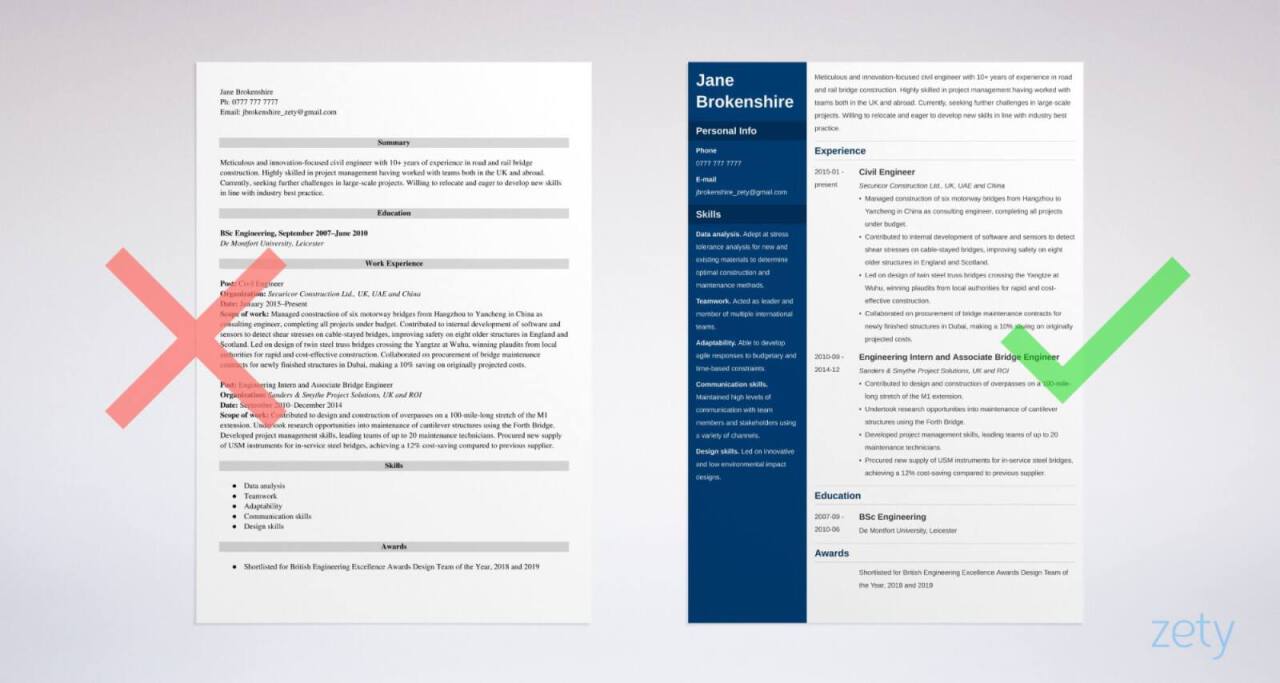Engineering CV: Examples & Personal Statement
Create your CV nowAs an engineer you act as the interface between research and reality. You’re the catalyst that helps bring innovation into the real world. Whatever your discipline, your job involves finding the most effective solutions to a problem and achieving the best outcome.
The good news is that you can use exactly the same approach to help you find the best engineering jobs. And you can do that with an engineering CV that’s constructed to the highest standards.
Read on and you’ll see engineering CV examples that will help you implement your own perfectly designed job application. And you’ll discover a simple formula for writing an engineer CV that’ll help you get more interviews than any CV you’ve written before.
Want to save time and have your CV ready in 5 minutes? Try our CV builder. It’s fast and easy to use. Plus, you’ll get ready-made content to add with one click. See 20+ CV templates and create your CV here.
Engineering CV made with our builder—See more CV examples here.
And if you’re not after an engineering job, we’ve got plenty of other CV writing guides. Read more here:
- How to Write a CV: Professional UK Examples
- Skills Based CV Template & Writing Guide
- What Should a CV Look Like?
- Graduate CV Example & Writing Guide
- Student CV Example & Writing Guide
- Internship CV Example & Writing Guide
- Career Change CV Example & Writing Guide
- Software Developer CV Example & Writing Guide
- Data Analyst CV Example & Writing Guide
- Project Manager CV Example & Writing Guide
- Graphic Designer CV Example & Writing Guide
Engineering CV Template
Jane Brokenshire
Ph: 0777 777 7777
Email: jbrokenshire_zety@gmail.com
Meticulous and innovation-focused civil engineer with 10+ years of experience in road and rail bridge construction. Highly skilled in project management having worked with teams both in the UK and abroad. Currently, seeking further challenges in large-scale projects. Willing to relocate and eager to develop new skills in line with industry best practice.
Work Experience
Civil Engineer
Securicor Construction Ltd., UK, UAE and China
January 2015–Present
- Managed construction of six motorway bridges from Hangzhou to Yancheng in China as consulting engineer, completing all projects under budget.
- Contributed to internal development of software and sensors to detect shear stresses on cable-stayed bridges, improving safety on eight older structures in England and Scotland.
- Led on design of twin steel truss bridges crossing the Yangtze at Wuhu, winning plaudits from local authorities for rapid and cost-effective construction.
- Collaborated on procurement of bridge maintenance contracts for newly finished structures in Dubai, making a 10% saving on originally projected costs.
Engineering Intern and Associate Bridge Engineer
Sanders & Smythe Project Solutions, UK and ROI
September 2010–December 2014
- Contributed to design and construction of overpasses on a 100-mile-long stretch of the M1 extension.
- Undertook research opportunities into maintenance of cantilever structures using the Forth Bridge.
- Developed project management skills, leading teams of up to 20 maintenance technicians.
- Procured new supply of USM instruments for in-service steel bridges, achieving a 12% cost-saving compared to previous supplier.
Education
BSc Engineering, September 2007–June 2010
De Montfort University, Leicester
Skills
- Data analysis. Adept at stress tolerance analysis for new and existing materials to determine optimal construction and maintenance methods.
- Teamwork. Acted as leader and member of multiple international teams.
- Adaptability. Able to develop agile responses to budgetary and time-based constraints.
- Communication skills. Maintained high levels of communication with team members and stakeholders using a variety of channels.
- Design skills. Led on innovative and low environmental impact designs.
Awards
- Shortlisted for British Engineering Excellence Awards Design Team of the Year, 2018 and 2019
Now for the job-winning formula for your engineering CV.
1. Choose the Best Format for Your Engineering CV
An engineer uses mathematics and science to solve problems. They help to transform scientific discoveries into commercially viable applications that meet real-world needs. The discipline of engineering is so broad that it’s hard to define exactly what they do. But it’s the intelligent methods that engineers use to solve problems that makes them unique.
So the purpose of your engineering CV is to show that you’re adept at intelligently solving problems in your chosen field. And there’s an established formula for writing your CV that’s the proven method of solving your job search problems. Here it is.
- The best engineering CV format is chronological. It uses your professional experience as its foundation and it’s the format recruiters know best.
- CV structure is essential too, it creates a framework for you to build on. Here’s how to set it up: left-align your text and don’t use justification, leave a double space between sections, make your page margins one inch on each side.
- Following those layout rules creates white space in your CV, and that makes it easier to read and understand.
- Opt for an easily readable and professional font. Solid choices for CV fonts include Trebuchet MS, Didot and Georgia.
- Don’t over-engineer. The maximum length of a CV is two pages.
- And when you’re ready to save your work, use PDF format to keep your layout intact.
Read more: How to Layout a CV: Professional Guidelines and Tips
2. Build Your Engineering CV Personal Statement
Your engineering personal statement, or personal profile, is the first section of your CV. It acts as the introduction to the main body of your CV and in just 3–4 sentences it has to convince the hiring manager to keep reading. The best way to write it is to focus on the following questions.
- Who are you?
- What can you offer to the employer?
- What are your career goals?
All you need to do is answer those questions differently depending on your level of experience. If you’re just launching your career and writing an engineering graduate CV then do this.
- Write a list of all the skills and experience you have. Pay close attention to your education, internships and other work experience.
- Then highlight 3–4 points on your list that match up with what’s required in the graduate job you’re targeting.
- Finally, combine those points with knowledge of the employer and passion for the industry to write your graduate engineer CV personal profile.
If you’re more experienced, then follow this formula.
- List everything that makes you a successful engineer. Take into account the entirety of your professional experience and skills.
- Then refer to the job description for the role you’re targeting, note the experience and skills required, and choose 3–4 points from your list that match.
- Use those points to write an engineering personal statement that’s tailored to the job you’re applying for.
And in both situations it’s best to write this section of your CV last. That way your work experience and skills are already laid out and ready to refer to.
Read more: How to Write a Professional CV Summary
3. Construct Your Engineering CV Work Experience Section
Your work experience section is the linchpin of your CV. If you get it wrong the wheels will come off your job application, so here’s how to make sure it holds firm.
- List your work experience in reverse chronological order.
- For each role include the following information: your job title, the name of your employer, your dates of employment (use “present” as the end date if you still work there).
- Then write 4–6 bullet points describing the job. Start them with action verbs to make them stand out.
- Don’t just write a summary of your duties. Write about quantifiable and numbered achievements. The most effective way of doing that is to structure your bullet points using accomplishment statements.
- Write a fresh work experience section for every new job application. Make it targeted by reading the job description to see what the hiring manager needs and tailor your work experience to match.
Read more: What to Include in Your CV Work Experience Section
4. Include an Education Section in Your Engineer CV
Engineering is a highly technical field, so it’s essential to show you’ve got an education to match. Your formal education in mathematical and scientific disciplines forms the basis for your professional achievements. Here’s how to get this section right.
- List the name of the university you attended, the full formal name of your degree, and the dates you studied there. If you’re preparing your engineering graduate CV and you’re still studying then include your expected graduation date.
- If you have more than one qualification then follow reverse chronological order and put your most recent attainment first.
- Only include honours if you achieved a first or a 2:1.
- And if you’re a fresh graduate then switch the order of your CV sections and put your education before your work experience.
5. Prove Your Engineering CV Skills
Biomedical, petroleum, mechanical, civil and electrical. Those are just a few of the dozens of fields of specialisation in engineering. Each one demands its own unique set of skills. So which skills are best to include on your CV? Here’s how to choose them.
- Refer back to our faithful cheat sheet, the job description. List all the skills it requires along with any other skills that are relevant to that field of engineering.
- Now list your own skills. Use your work experience and education sections as a point of reference.
- Compare the two lists, note what matches, then select 5–10 of the most relevant skills to incorporate into your CV.
- Include a good mix of soft skills, hard skills, and technical skills.
- And for every skill, write a sentence that shows how you demonstrate it. E.g. Teamwork. Acted as leader and member of multiple international teams.
Here’s a general list of skills that would make a great addition to your engineering CV. Just ensure that you include hard skills relevant to your area of specialisation, too.
Engineer CV Skills Sample
- Attention to detail
- Data analysis
- Design skills
- Lean methodology
- Communication skills
- Creativity
- Problem solving
- Adaptability
- Teamwork
- Organisation and planning
Read more: What Skills Should I Put on My CV? Best Examples
When making a CV in our builder, drag & drop bullet points, skills, and auto-fill the boring stuff. Spell check? Check. Start building your CV here.
When you’re done, Zety’s CV builder will score your CV and tell you exactly how to make it better.
6. Bolt-On Some Additional CV Sections
As an engineer, how do you approach your work?
- Do just enough to get the job done.
- Find the optimal solution to the engineering problem at hand, adding every necessary element for a successful outcome.
You chose the second option of course, and your CV is just the same. You can stop with your skills section and you’ll have got the job done but for the optimal solution you need some extra sections. So here are some ideas.
- Languages. Engineering is a profession that will take you far and wide in search of challenging projects. Being bilingual is a big plus in communicating with international companies and colleagues.
- Other good options are volunteering, awards and hobbies. There are 1.8 million workers in engineering-related roles in the UK so there’s a lot of competition. Anything that makes you stand out in such a crowded field is worth including.
Read more: Best Hobbies and Interests to Include on Your CV
7. Write an Engineering CV Cover Letter
The word engineer is derived from the Latin ingenium, which means cleverness. And the smartest thing you can do with your engineering job application is to write a cover letter to accompany your engineer CV. They’re still considered best practice for job seekers.
Here’s what to include in a cover letter for engineering jobs:
- Start with the correct cover letter formatting. Just like your CV, you need to follow a set structure.
- Include a “hook” in your cover letter opening lines. An eye-catching professional accomplishment will make sure the recruiter keeps reading.
- Then reinforce your cover letter structure by adding even more proof of your experience and skills as an engineer.
- End your cover letter with a call to action. Ask the hiring manager to get in touch with you so you can discuss the job further.
- Make sure the length of your cover letter is no more than one page.
And after you’ve sent off your job application there’s one more thing you need to do. Follow it up. If there’s no reply after a week, make contact to check on the status of your application. This last simple step can help distinguish you from other applicants and increase your chances of success.
And that’s all. Now you’re ready to write an engineering CV that’d make Isambard Kingdom Brunel proud.
Plus, a great cover letter that matches your CV will give you an advantage over other candidates. You can write it in our cover letter builder here. Here's what it may look like:
See more cover letter templates and start writing.
I hope you found our civil engineer CV template useful.
About Zety’s Editorial Process
Our editorial team has thoroughly reviewed this article to ensure it follows Zety’s editorial guidelines. Our dedication lies in sharing our expertise and providing you with actionable career advice that offers you real value. Every year, the quality of our content attracts 40 million readers to our site. But that’s not all – we conduct original research to gain a detailed understanding of the labour market. We take pride in being cited by top universities and leading media outlets in the UK and worldwide.





![10 Best CV Templates for Word to Download Now [2026]](https://cdn-images.zety.com/pages/uk_cv_template_word_2.jpg?fit=crop&h=250&dpr=2)
